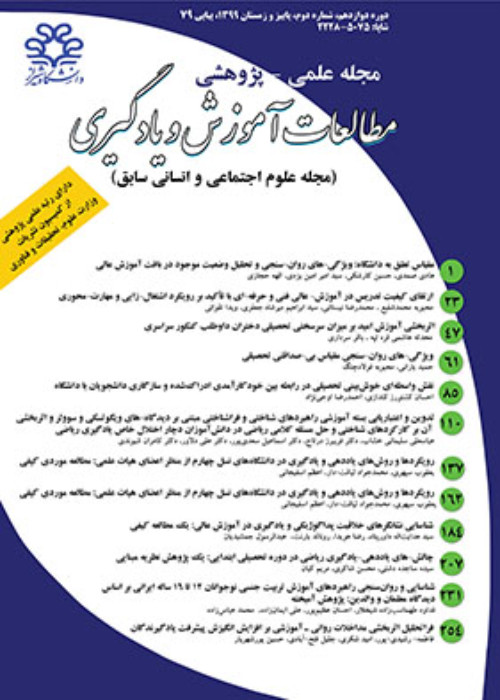Relationship between Cultural Values and Subjective Vitality: The Mediating Role of Self-Efficacy
Subjective vitality refers to the state of having the mental and physical energy necessary to experience a sense of enthusiasm and liveliness. It originates from such positive emotions as freedom, autonomy, self-control, and intrinsic motivation (Ryan & Deci, 2008) and influences the mental and physical aspects of human health as well as their interactions and alertness, thereby determining the overall well-being (Koppe, Harder, & Væver, 2008). Therefore, because subjective vitality, as a positive psychological state, corresponds with a more fruitful social life and fewer psychological problems, (Binyamin & Brender-Ilan, 2018), it is quite significant to identify the factors that contribute to and reinforce this psychological state. In this regard, several researchers have explored the role of individual and social factors as the two main predictors of subjective vitality (Nani, Matsouka, & Antoniou, 2018). Social values are indeed are among the main factors that can have a positive and/or negative effect on the development of personal skills and abilities, one of their positive effects being their impact on subjective vitality. Hence, researchers such as Kurita, Akizawa, & Fukuhara (2018) describe subjective vitality as a mental perception of happiness that people experience and that results from individual and social values. According to Scott, Rowe, and Pollock (2018), cultural values are also related to a fine and happy life, so that adopting correct values can promote vitality. Indeed, it is believed that individualist and collectivist cultural values, influenced by perceived social values, can create a sense of confidence in the individual and thereby set the scene for the promotion of vitality in them. Nevertheless, cultural values of the society are not the only determinants of subjective vitality experienced by the people; it seems that some positive experiences and emotions, in addition to the impact of environmental factors, are influenced by individual differences and factors (Kapraara, Alsandri, Diegoeta, Panier, & Isenberg, 2010). Selfefficacy, for instance, is one of the individual factors that can affect subjective vitality. According to Bandura (1982), self-efficay refers to the individual’s beliefe in their success in special circumstances by changing and amending the existing situations. In this regard, several recent studies (Bandar & Ingram, 2018; Carter, Brin, Yarous, & Bilbi, 2017; Mersardo et al., 2018) have have investigated this construct and have identified different predecessors and outcomes for it, one of which being cultural values. However, little research has explored the relationship between self-efficcy and subjective vitality, and its interaction with cultural values. Nevertheless, with cultural values being one of the determinants of subjective vitality, and the main factors affecting self-efficacy, it is possible that the with a consideration of self-efficacy, the impact of cultural values on subjective vitality not be direct and linear, as some studies suggest. In other words, although cultural values do affect subjective vitality, their impact might be mediated by individual self-efficacy, or the individual’s perception of the influence they can have on their circumstances (Lekes, Houlfort, Milyavskaya, Hope, & Koestner). In sum, due to the causes and antecedents of subjective vitality and the role played by each of these causes, the present study aimed to investigate the mediating role of selfefficacy in the relationship between cultural values and subjective vitality.
1. Cultural values are directly related to subjective vitality. 2. Cultural values are directly related to self-efficacy 3. Self-efficacy has a mediating role between cultural values and subjective vitality.
A correlational research design was used to test the research hypotheses. Participants were 448 students at Shiraz University (174 men and 274 women) who were selected via random multi-stage cluster sampling method. The data was collected, administering three questionnaires including subjective vitality, task value scale, self-efficacy, and horizontal, vertical individualism and collectivism questionnaires. The proposed model was tested using structural equation modeling in AMOS software.
The findings indicated that the proposed model fit the data properly. Better fit and more meaningful results were obtained by eliminating one insignificant path. The results indicated that the influence of individualist and collectivist values on subjective vitality was significantly positive. On the other hand, the effect of individualism on self-efficacy was significantly positive. Similarly, the influence of self-efficacy on subjective vitality was significantly positive. The results further suggested that individualism, mediating selfefficacy, indirectly predicted subjective vitality.
Direct hypothesis examination indicated that cultural values could significantly predict subjective vitality. In this respect, Ryan and Frederick (1997) argue that subjective vitality is affected by environmental factors. In environmental factors domain, cultural values are a path that affects individuals' beliefs, values, vitality and liveliness. Based on research findings, individualism could significantly predict self-efficacy. Societies with individualist norms emphasize self-reliance and self-sufficiency, and such norms influence their members’ self-construal and guide their behavior. People from individualist societies tend to view the self as unique, bounded, and independent of other people; therefore, success and self-efficacy are endorsed and encouraged in individualist cultures. Moreover, self-efficacy could significantly predict subjective vitality. According to Bandura, selfefficacy plays an effective role in human accomplishment and subjective vitality as part of well-being. The examination of the indirect hypothesis in the study indicated that individualism with the mediation of self-efficacy could predict subjective vitality. The results of this research provide insights for students, families, higher education centers, and all those involved in educational policy. The results of this study show the importance of cultural values in influencing the students' self-efficacy and subjective vitality, which can be considered as a practical and theoretical point of view. The results of this study show that, by emphasizing the individualistic values, students will have a stronger sense of self-efficacy, which can lead to their increased subjective vitality.
- حق عضویت دریافتی صرف حمایت از نشریات عضو و نگهداری، تکمیل و توسعه مگیران میشود.
- پرداخت حق اشتراک و دانلود مقالات اجازه بازنشر آن در سایر رسانههای چاپی و دیجیتال را به کاربر نمیدهد.


